|
 Amethyst Galleries' Mineral Gallery MINERALS |
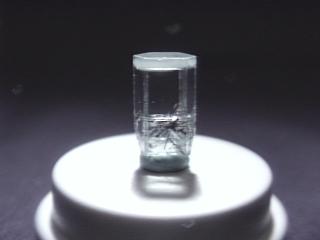
AQUAMARINE specimen aqu-4
$ 20.00
$ 20.00
Dims: 0.9" x 0.2" x 0.2"(2.3 x 0.5 x 0.4 cm)
Wt: 0.9 g
SIGHAR, Northwest Frontier Province, Pakistan
This specimen consists of a single Aquamarine crystal with excellent form and very little damage. It occurs as a hexagonal prism with a complex hexagonal pyramidal termination that is truncated by a basal face. The faces and edges are all very smooth and clean, except for two on the termination which appear to have been damaged near the end of the crystal's formation. It has a very pale blue color, a vitreous luster, and is transparent and quite clear. There are some internal flaws which run about halfway up the prism length, and a few tiny needle-like black crystals(possibly tourmaline) are also scattered about in this lower half. The crystal's base has a few bits of black tourmaline or maybe epidote that surround a small bit of Aquamarine crystal which has intergrown with the larger one, making it appear to be a scepter crystal of some sort. This excellent little crystal is affixed to a domed thimble box.
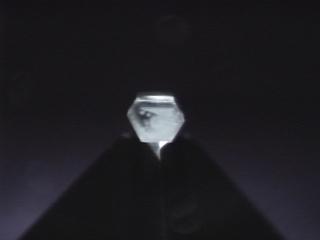

aqu-4 ($ 20.00)
SIGHAR, Northwest Frontier Province, Pakistan
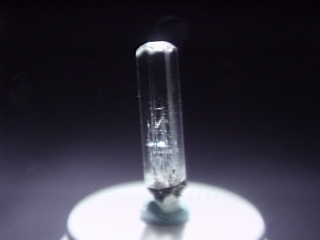
AQUAMARINE specimen aqu-5
$ 18.00
$ 18.00
Dims: 0.5" x 0.3" x 0.2"(1.3 x 0.8 x 0.5 cm)
Wt: 0.7 g
SIGHAR, Northwest Frontier Province, Pakistan
This singluar Aquamarine crystal has excellent hexagonal prismatic form with a flat basal face truncated by a few tiny, sloping secondary faces. It appears to have no huma-induced damage and clean faces and edges. An indentation where a partially-intergrown crystal was removed is visible near its base, where it intersects two prism faces and two edges. It has a very pale blue color, a vitreous luster, and is transparent and mostly very clear. There are several tiny, radiating clusters of what I believe to be tourmaline in the lower half of the crystal. These crystals are colored black and are thinner than human hairs; they do not exceed 2 mm in length. The upper half of the crystal is quite clear until about 2 mm below the termination. At that point there is a very cloudy layer that extends almost to the top of the crystal, where there is another tiny thin band of clarity. Looking down on the termination face, one can see that this cloudy layer does not extend to the full radius of the crystal, so that there is a thin border of clarity around its edges, and it has a definite hexagonal shape. The crystal is affixed in a domed plastic thimble box.

aqu-5 ($ 18.00)
SIGHAR, Northwest Frontier Province, Pakistan
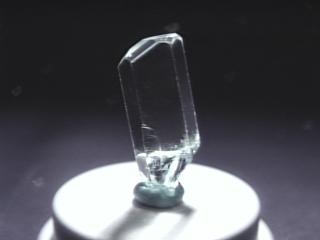
AQUAMARINE specimen aqu-6
$ 26.00
$ 26.00
Dims: 0.8" x 0.3" x 0.2"(2.0 x 0.8 x 0.5 cm)
Wt: 1.3 g
SIGHAR, Northwest Frontier Province, Pakistan
This specimen consists of a single Aquamarine crystal that has excellent form and near-absolute clarity, but shows a large, curved break near where its base should be. Its faces and edges are all clean, and only a few tiny "dings" mar its termination, which is complex and not concentric to its oblong, hexagonal cross-section. Accompanying the break is a large, conchoidal chip taken out of the lower half of one prism edge. One could cut a small but fine stone out of this crystal. It just didn't break evenly out of its host rock.

aqu-6 ($ 26.00)
SIGHAR, Northwest Frontier Province, Pakistan
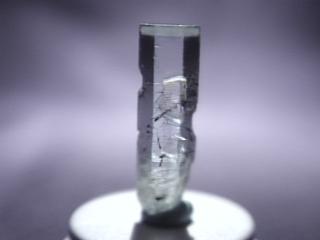
AQUAMARINE specimen aqu-7
$ 45.00
$ 45.00
Dims: 1.0" x 0.3" x 0.3"(2.5 x 0.8 x 0.8 cm)
Wt: 2.3 g
SIGHAR, Northwest Frontier Province, Pakistan
This crystal has a lot of "business" going on inside of it and on its surface. It occurs in the standard hexagonal prismatic form with a flat basal termination, but has several geometric depressions along its prism surface that represent partial intersection by other crystals. Besides that, there are also dozens of tiny, black needle-like crystals in the lower two-thirds of its prism length that are likely made up of tourmaline. One or two veil-like inclusions and one internal fracture are visible down near the crystal's base, further interfering with its transparent clarity. The top one-third of the crystal is clear until about 2 mm below the termination, where a strange, cloudy inclusion makes a layer that runs parallel to the basal face. There is a tiny layer of clarity between it and the termination, and looking down on the basal face shows that the cloudiness is not uniform, and has a hexagonal shape that is slightly smaller than the crystal's cross-section, so there are clear zones between the cloudiness and the prism faces. I am interested in finding out what causes these "phantoms"(can they be called that?). The specimen is encased in a domed plastic thimble box.
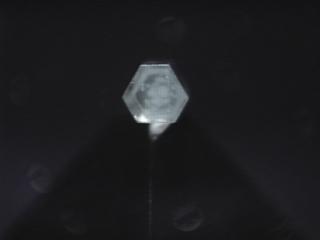

aqu-7 ($ 45.00)
SIGHAR, Northwest Frontier Province, Pakistan
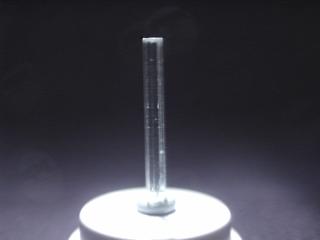
AQUAMARINE specimen aqu-8
$ 41.00
$ 41.00
Dims: 1.1" x 0.2" x 0.1"(2.8 x 0.4 x 0.3 cm)
Wt: 0.7 g
SIGHAR, Northwest Frontier Province, Pakistan
This crystal, though rather small, is extremely clear and is double-terminated. It has a pale blue coloration and is, of course, transparent, with a vitreous luster. It occurs in a hexagonal prismatic form, and has basal terminations. One of the terminations is imperfectly formed, due to interference of foreign material, where the crystal was attached to its host rock. There is a straight, shallow groove about 0.3" (0.7 cm) long near the termination, where another crystal barely intersected it at an angle. Its form is excellent, though there are a few tiny, conchoidal "dings" near the terminations. The termination that has the least interrupted form shows some natural wear, but is intact. I have affixed this crystal inside a domed thimble box with a removable putty for display.

aqu-8 ($ 41.00)
SIGHAR, Northwest Frontier Province, Pakistan
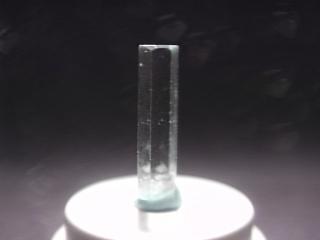
AQUAMARINE specimen aqu-9
$ 47.00
$ 47.00
Dims: 0.8" x 0.3" x 0.2"(2.0 x 0.8 x 0.5 cm)
Wt: 1.0 g
SIGHAR, Northwest Frontier Province, Pakistan
This hexagonal prismatic Aquamarine crystal is in very good condition, having only 2 tiny conchoidal chips on its basal termination as far as damage is concerned. Its form is excellent, with well-defined edges and clean, smooth faces that show off its vitreous luster. The basal termination has small angled secondary faces that truncate it at each of the six corners and three of the edges. It appears to be nearly colorless, but one can see a pale blue-green hue when looking down its length thorough the basal face. It is transparent and quite clear, showing almost no visible inclusions without magnification, though there is a tiny, dark, needlelike crystal growing up from the base about 2 mm into the Aquamarine. I have placed it in a domed thimble box for display.

aqu-9 ($ 47.00)
SIGHAR, Northwest Frontier Province, Pakistan
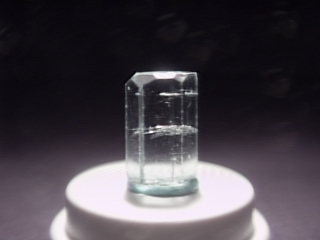
AQUAMARINE specimen aqu-10
$ 103.00
$ 103.00
Dims: 0.6" x 0.4" x 0.3"(1.5 x 1.0 x 0.8 cm)
Wt: 2.1 g
SIGHAR, Northwest Frontier Province, Pakistan
A rather short and stubby Aquamarine crystal makes up this thumbnail specimen. It occurs in the standard hexagonal prismatic form and has a basal termination that is mostly truncated by several angled secondary faces. It is in excellent condition with only 2 tiny conchoidal chips visible along its prism length, and has well-defined edges and very clear, smooth faces that show off its vitreous luster. The crystal's color is a pale blue-green, and it is transparent and clear, though there are a few internal fractures and veil-like inclusions that are visible and more or less aligned with the basal face. Even with these inclusions, though, one could conceivably cut 2 brilliant- or cushion-cut stones from this crystal. I have affixed it in a domed thimble box for display.

aqu-10 ($103.00)
SIGHAR, Northwest Frontier Province, Pakistan
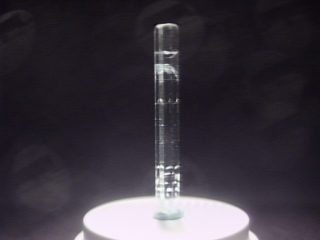
AQUAMARINE specimen aqu-11
$ 104.00
$ 104.00
Dims: 1.7" x 0.2" x 0.2"(4.3 x 0.5 x 0.5 cm)
Wt: 2.2 g
SIGHAR, Northwest Frontier Province, Pakistan
I believe that this is one of the more attractive Aquamarine crystals in our present stock. It is long and slender, with excellent hexagonal prismatic form and double basal terminations which are both partially truncated by very small secondary faces. Aside from a single, tiny conchoidal chip in one prism edge, it is free from damage. Though it appears nearly colorless when looking through its prism faces, its pale blue-green hue is more readily visible when viewing it through either basal face. Its smooth faces show its vitreous luster, and it is transparent and quite clear. There are "zones" of inclusion about 0.2- 0.3" (5- 8 mm) from and more or less aligned with each basal face. One "zone" consists of two veil-like inclusions and perhaps a small internal fracture, whereas the other one is made up of several tiny, included muscovite crystals. The rest of the crystal's length is relatively free from inclusions. I have placed it in a domed thimble box for display.

aqu-11 ($104.00)
SIGHAR, Northwest Frontier Province, Pakistan
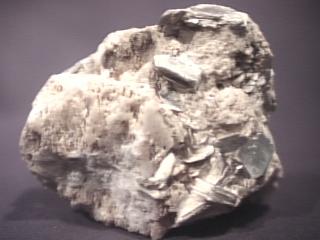
AQUAMARINE specimen aqu-12
$ 60.00
$ 60.00
Dims: 3.5" x 3.1" x 1.9" (8.9 x 7.9 x 4.8 cm)
Wt: 11.7 oz. (331 g)
NAGAR, Northwest Frontier Province, Pakistan
A single Aquamarine crystal rests on the host rock of this specimen. It has excellent hexagonal prismatic form with a basal termination and only some very minor chipping around its edges. Otherwise, its edges are well-defined and its faces are quite smooth, showing off its vitreous luster. Its color is an impressively deep blue for an untreated crystal of its size, and it is transparent and clear, though several inclusions provide interference. As the crystal grew, it enveloped part of one of the many "books" of muscovite that also rest on the matrix. Some of these books are in excellent condition and have very good hexagonal tabular form. All rest on a base of albite that is crystalline but worn and broken.
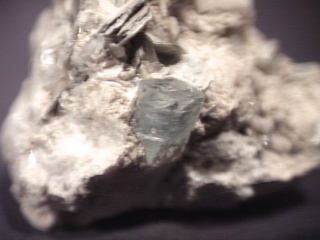

aqu-12 ($ 60.00)
NAGAR, Northwest Frontier Province, Pakistan
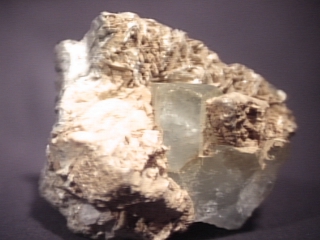
AQUAMARINE specimen aqu-13
$ 90.00
$ 90.00
Dims: 3.0" x 2.8" x 2.5" (7.6 x 7.1 x 6.4 cm)
Wt: 15.5 oz. (439 g)
NAGAR, Northwest Frontier Province, Pakistan
This specimen consists of a rather large, thick Aquamarine crystal that is partially buried in a crust of intergrown albite and muscovite crystals, a commmon matrix material for Pakistani specimens. The crystal measures 1.6" (4.1 cm) long and 0.8" (2.0 cm) in diameter, and has no detectable damage. It has excellent hexagonal prismatic form with a basal termination face that is truncated by rather complex secondary faces, and it has very well-defined edges and clean, smooth faces that show off its vitreous luster. Its color is a pale blue-green and it is transparent but has many veil-like inclusions that interfere with its clarity. Nonetheless, one can see a considerable depth into the crystal. There are other portions of large crystals adjacent to this one, but they are heavily damaged and broken. The crust of albite and muscovite that partially envelops the Aquamarine covers a host rock that appears to be made up of very finely-grained massive albite that is intermixed with equally fine muscovite. This host rock contains what appear to be either black tourmaline or epidote crystals that show a definite form but are mostly buried and rather heavily broken. This is one of the more impressive Aquamarine specimens that we have with respect to crystal size.
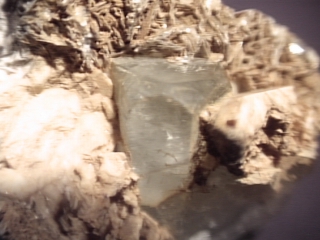

aqu-13 ($ 90.00)
NAGAR, Northwest Frontier Province, Pakistan
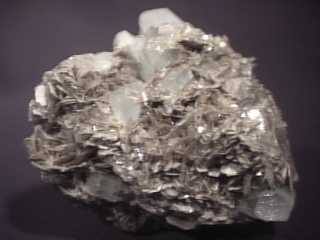
AQUAMARINE specimen aqu-14
$ 150.00
$ 150.00
Dims: 4.1" x 3.4" x 1.8" (10.4 x 8.6 x 4.6 cm)
Wt: 15.0 oz. (424 g)
NAGAR, Northwest Frontier Province, Pakistan
Upon first glance, this specimen appears to consist of a mass of muscovite crystals upon which rest several crystals of Aquamarine. These Aqua crystals range in size from 0.4" (1.0 cm) long and 0.2" (0.5 cm) in diameter to 0.8 x 0.5" (2.0 x 1.3 cm). All have excellent hexagonal prismatic form and basal terminations that are sometimes truncated by secondary faces- one of the crystals is double-terminated. Nearly all of the crystals show some minor damage, and one or two are obviously broken. However, they are generally in good condition, and their edges are well-defined and their faces are quite smooth, accentuating their vitreous luster. All have a very pale blue-green color and are transparent, and they range from being almost cloudy with inclusoions to being very clear; the smaller crystals are generally the clearest on this piece. They rest among hundreds of small muscovite crystals that show considerable damage but have very good hexagonal tabular form. On the specimen's underside, where it was separated from its place of origin, one can see what appears to be a finely-grained massive albite host rock that is intermixed with equally fine bits of muscovite. It seems, however, that most of the specimen's mass is made up of the larger muscovite crystals and the Aquamarines.
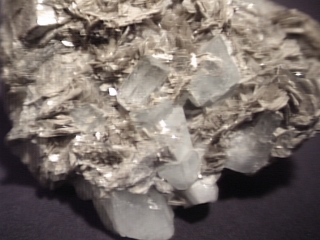

aqu-14 ($150.00)
NAGAR, Northwest Frontier Province, Pakistan
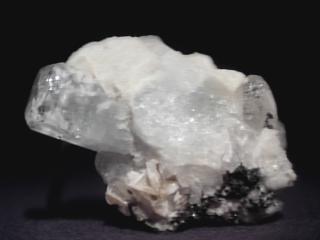
AQUAMARINE specimen aqu-15
$ 70.00
$ 70.00
Dims: 2.1" x 1.5" x 0.7" (5.3 x 3.8 x 1.8 cm)
Wt: 1.08 oz. (30.6 g)
Haramosh Valley, Gilgit, Pakistan
This small hand specimen basically consists of a single, complete hexagonal prismatic Aquamarine crystal growing out of a matrix of albite, muscovite, quartz, and shards of other, broken Aquamarine crystals. The intact crystal has dimensions of 0.8 x 0.5 x 0.4" (2.0 x 1.3 x 1.0 cm), and is in excellent condition. Its form is also very good, showing well-defined edges and smooth faces that have a bright, vitreous luster. Its color starts as a pale blue at its base and fades to a near colorlessness at its termination. Between the many albite inclusions and internal fractures, there are small areas of exceptional clarity, going right through the crystal. This clarity and the prominence of its secondary termaination faces make it quite attractive in my mind.
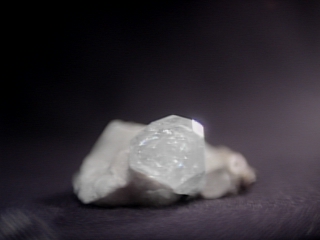

aqu-15 ($ 70.00)
Haramosh Valley, Gilgit, Pakistan
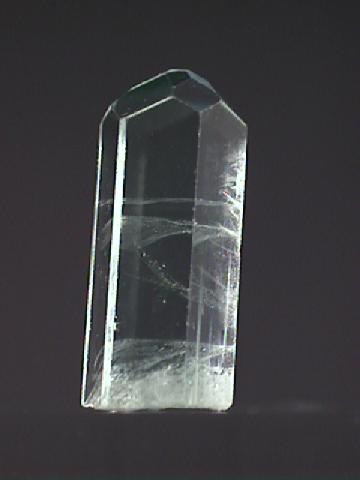
AQUAMARINE specimen aqu-17
$ 45.00
$ 45.00
Dims: 0.7" x 0.3" x 0.2" (1.8 x 0.8 x 0.5 cm)
Wt: 1.4 g
SIGHAR, Northwest Frontier Province, Pakistan
This thumbnail specimen consists of a single Aquamarine crystal that is in excellent condition. Other than the breakage surface at its base, it is completely undamaged. It has a good hexagonal prismatic form, with well-defined edges and clean faces that show a bright, vitreous luster; a few of the faces show some mild, isolated striating near the base that fades towards the termination. The termination is exceptionally well-formed and shows one basal primary, six secondary and seven tertiary faces (see the close-up image). It is not quite symmetrical. The crystal's color is a very subtle, pale blue, and it is transparent and relatively clear, though a few veil-like inclusions are obviously visible.
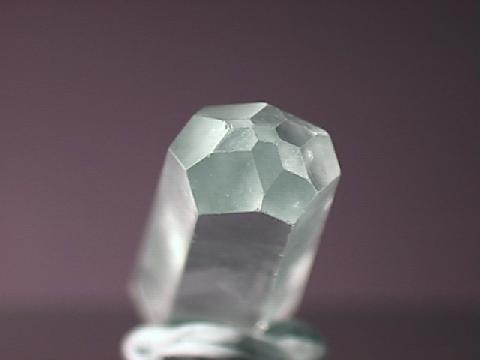

aqu-17 ($ 45.00)
SIGHAR, Northwest Frontier Province, Pakistan
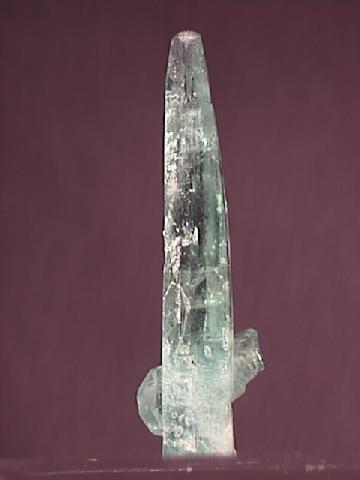
AQUAMARINE specimen aqu-18
$ 100.00
$ 100.00
Dims: 1.7" x 0.5" x 0.4" (4.3 x 1.3 x 1.0 cm)
Wt: 3.4 g
Vittoria Mine, Esprito Santo, Brazil
When I saw this specimen, I knew that we had to acquire it for our selection. It consists of 2 Aquamarine crystals that are partly intergrown. Their color is an unusually deep blue-green for their size, and their form is exceptional. The larger of the two crytstals measures 1.7" long and though it has a hexagonal prismatic form, its prism gradually tapers almost to a point before it is capped by a tiny basal termination that is truncated by even smaller secondary faces. It is undamaged and shows the standard vitreous luster, and is transparent and quite clear, though there are substantial internal fractures within. The smaller crystal is mostly incomplete, as it is at the point of the piece's separation surface. It still has a definable hexagonal prismatic form, though, and its basal termination is intact. Its form is much more standard than that of its partner, though it has the same color, luster, and clarity. There is no host rock present.
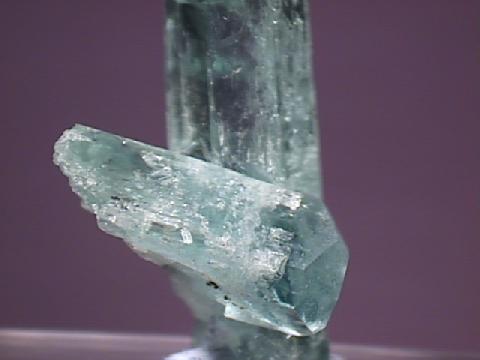

aqu-18 ($100.00)
Vittoria Mine, Esprito Santo, Brazil

$ 400.00
Dims: 2.3" x 1.4" x 0.8" (5.8 x 3.6 x 2.0 cm)
Wt: 16.6 g
Vittoria Mine, Esprito Santo, Brazil
This lovely piece consists of at least 15 intergrown Aquamarine crystals. They range in length from 1 mm to 2.3" (5.8 cm), and though many of them are damaged and missing their terminations, they do not detract much from the specimen as a whole. This is due to the fact that the largest crystal shows an exceptional and unusual form. Its hexagonal prism starts to taper about halfway up its length, and gradually narrows to a fine, sharp point. I had not seen this occurrence in Aquamarine before I laid eyes on this piece. The other crystals have the more standard prismatic form and are capped with basal faces, where intact. All have a blue-green color that is unusually dark for the crystals' size and a luster that ranges from pearly to vitreous. They are all transparent and show noticeable clarity, though the larger crystals tend to contain many internal fractures. There is no host rock- the crystals' intergrowth holds them together.
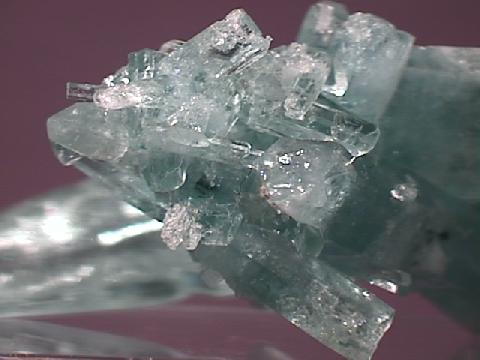

Vittoria Mine, Esprito Santo, Brazil
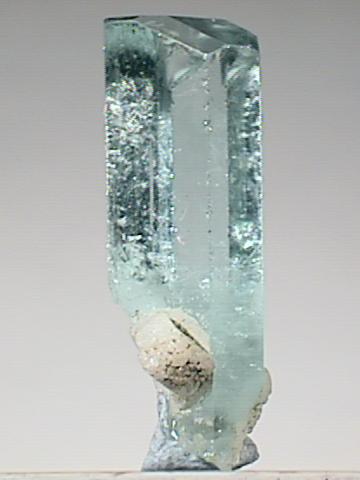
AQUAMARINE specimen aqu-20
$ 360.00
$ 360.00
Dims: 1.3 x 0.5 x 0.4" (3.2 x 1.2 x 1.1 cm)
Wt: 6.3 g
NAGAR, Northwest Frontier Province, Pakistan
This thumbnail specimen consists of a single, well-developed Aquamarine crystal. It is in excellent condition, showing only fresh damage where it was separated from its host and has excellent hexagonal prismatic form, with well-defined edges and very clean, smooth faces that possess the standard vitreous luster. Its color is a very pale blue with a hint of green, and it is transparent and very clear, containing one thin internal fracture that runs its length. It does cloud up a bit at its base, to which is attached a small amount of a white feldspar.

aqu-20 ($360.00)
NAGAR, Northwest Frontier Province, Pakistan
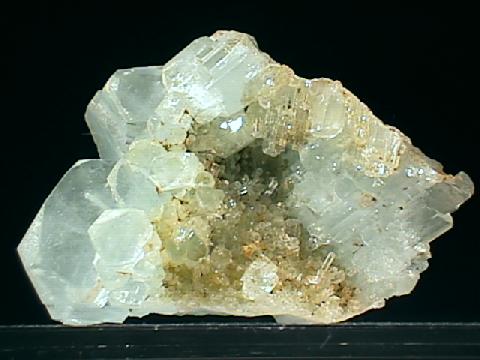
AQUAMARINE specimen aqu-21
$ 600.00
$ 600.00
Dims: 3.5 x 2.5 x 2.3" (8.9 x 6.5 x 5.7 cm)
Wt: 9.9 oz. (282 g)
SIGHAR, Northwest Frontier Province, Pakistan
This exceptional piece is made up entirely of Aquamarine- it consists of scores, if not hundreds, of Aquamarine crystals that extend in several directions and have intergrown in 2 of them. These crystals reach dimensions of 1.2 x 1.1 x 0.9" (3.0 x 2.9 x 1.9 cm), though most are only a fraction of that size. All have excellent hexagonal prismatic form with generally truncated basal terminations- their faces are quite clean and show a vitreous luster. Their color is generally a very pale blue, but dirt and rust trapped between many of the smaller crystals makes most of them appear green. All are transparent and dimly to moderately clear, containing concentrated cloudy inclusions in areas and some internal fractures.
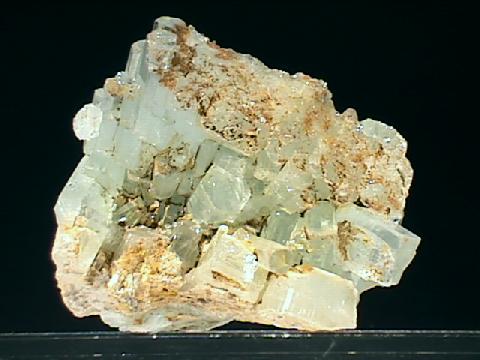

aqu-21 ($600.00)
SIGHAR, Northwest Frontier Province, Pakistan
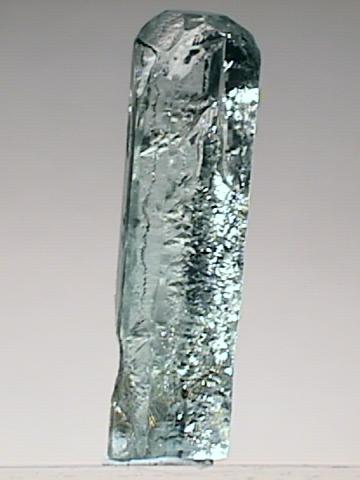
AQUAMARINE specimen aqu-22
$ 100.00
$ 100.00
Dims: 1.6 x 0.4 x 0.4" (4.1 x 1.1 x 1.0 cm)
Wt: 8.6 g
Minas Gerais, Brazil
This single Aquamarine crystal is in excellent condition, showing almost no fresh damage- even the breakage surface on its base has been partly healed over. It has excellent hexagonal prismatic form that features very odd and complex growth patterns on its prism faces, which show the standard vitreous luster. Its color is a very pale green-blue, and it is transparent and quite clear. However, it does contain a few small internal fractures and some small inclusions that might be tiny rutile needles.

aqu-22 ($100.00)
Minas Gerais, Brazil
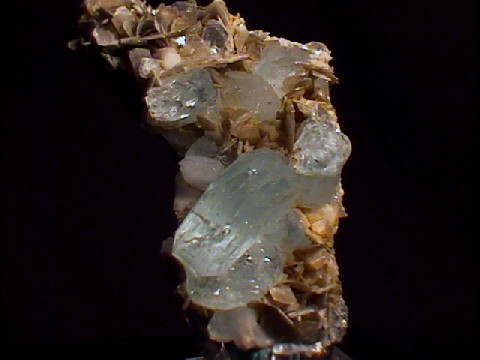
AQUAMARINE specimen aqu-24
$ 100.00
$ 100.00
Dims: 3.4 x 2.4 x 1.3" (8.6 x 6.0 x 3.4 cm)
Wt: 4.0 oz. (115 g)
Pingwu, Sichuan Province, China
At least 12 Aquamarine crystals rest on the siliceous base of this cabinet specimen. The largest of these measures 1.1 x 0.8 x 0.4" (2.8 x 2.0 x 1.1 cm). All but two or three small, edgeward crystals are in excellent condition, showing almost no damage, and all show excellent though somewhat modified hexagonal form that is almost tabular in nature. This form includes both secondary and tertiary faces that truncate the basal faces of each crystal, which themselves are heavily patterned. All have a rather faint aqua-blue coloration and the standard vitreous luster, and are transparent and moderately to very clear, containing visible internal flaws. They rest on a bed of small muscovite books that have excellent form, which in turn rests on a gray, quartz-encrusted base rock.
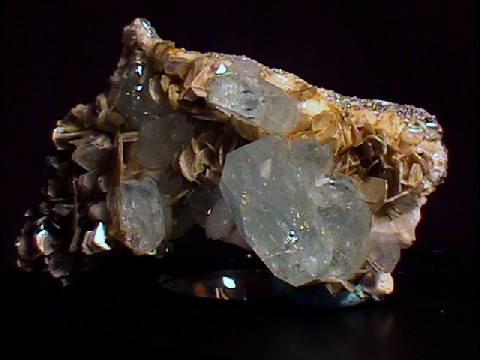

aqu-24 ($100.00)
Pingwu, Sichuan Province, China
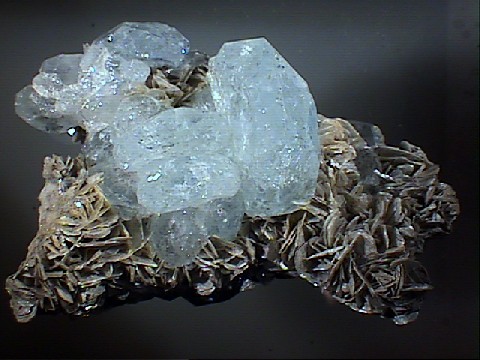
$ 450.00
Dims: 3.8 x 2.7 x 2.6" (9.6 x 6.9 x 6.7 cm)
Wt: 12.5 oz. (355 g)
Pingwu, Sichuan Province, China
The crystalline muscovite base of this cabinet specimen holds at least 25 thick, tabular Aquamarines. These crystals reach maximum dimensions of 1.6 x 0.9 x 0.6" (4.2 x 2.4 x 1.6 cm) and are generally in excellent condition- one is broken and incomplete, a few others show only very light damage, and most are intact. Their form is very good and essentially tabular, as their prism lengths are smaller than their widths. All are doubly-terminated and show secondary and tertiary termination faces around their primaries, which tend to be heavily patterned. Their pale blue color is rather faint and their luster is vitreous, of course. All are transparent and dimly to moderately clear, containing many internal fractures and inclusions. The muscovite crusts that make up their base bristle with well-formed monoclinic blades that are generally in very good condition.
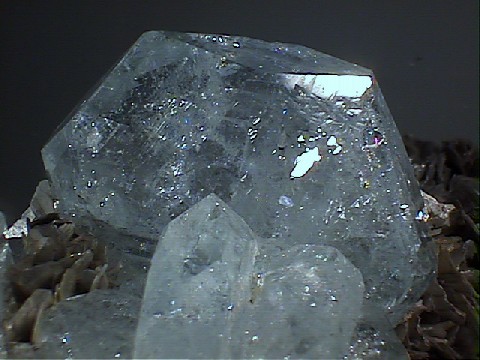

Pingwu, Sichuan Province, China
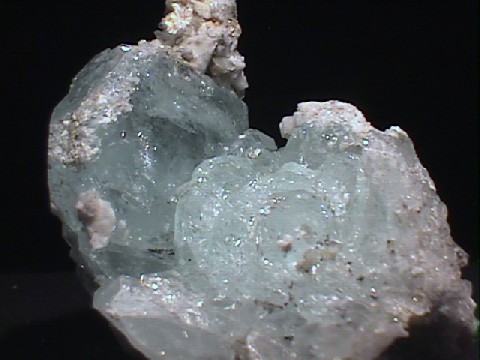
AQUAMARINE specimen aqu-23
$ 300.00
$ 300.00
Dims: 2.9 x 2.7 x 2.3" (7.3 x 6.9 x 6.8 cm)
Wt: 8.1 oz. (229 g)
Pingwu, Sichuan Province, China
The bulk of the mass of this cabinet piece is made up of heavily intergrown, tabular Aquamarine crystals. These crystals are generally in very good condition, showing light to moderate damage in a few areas, and reach dimensions of 1.8 x 1.3 x 0.7" (4.5 x 3.3 x 1.9 cm). All have excellent hexagonal tabular form, with doubled, heavily patterned primary termination faces that are truncated with both secondary and tertiary faces. All have a pale aqua-blue coloration and the standard vitreous luster, and are transparent and dimly to moderately clear due to intense internal fracturing and the presence of many inclusions. A few clusters of misshapen orthoclase crystals and well-formed muscovite blades accompany the cluster, but there is no actual base or host rock present.
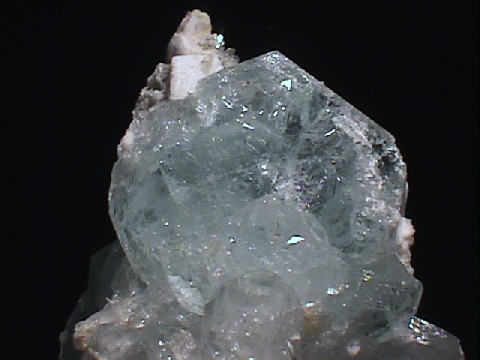

aqu-23 ($300.00)
Pingwu, Sichuan Province, China
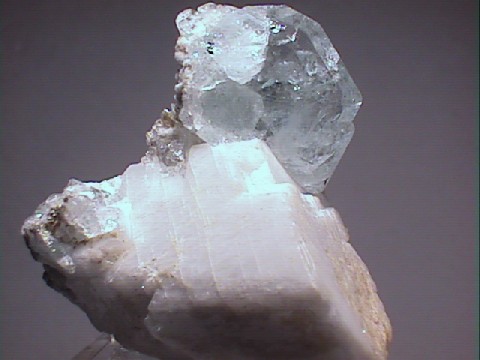
AQUAMARINE specimen aqu-26
$ 30.00
$ 30.00
Dims:1.9x1.9x1.2" (4.8x4.8x3.0 cm)
Wt: 1.9oz. (53g)
Pingwu, Sichuan province, China
This specimen consists of a twinned crystal of aquamarine growing from a matrix of albite and muscovite. The aquamarine is large- 1.1" (2.8cm) across. It is really unusual that there are no prism faces on this crystal; it is comprised entirely of termination faces. Although only about half of the crystal is exposed, the twin plane is clearly visible. This crystal is nearly transparent, and a very pale blue in color. There is no damage to the primary aquamarine crystal. Excellent!

aqu-26 ($ 30.00)
Pingwu, Sichuan province, China
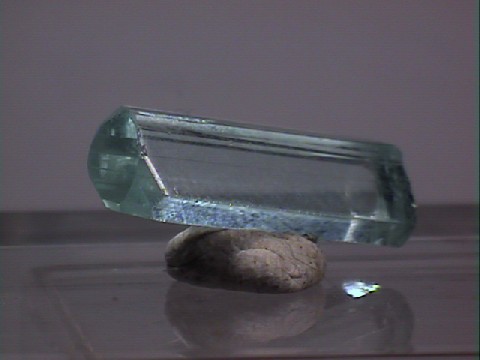
AQUAMARINE specimen aqu-27
$ 45.00
$ 45.00
Dims:0.6x0.2x0.2" (1.5x0.5x0.5 cm)
Wt: 0.2oz. (7g)w/base
Gilgit, Pakistan
This is a splendid single crystal of water-clear aquamarine. It has an excellent basal termination, and is completely gem quality. This crystal is a very, very pale blue color. The only damage to this crystal is where it was broken from the matrix. It comes with a clear acrylic base.

aqu-27 ($ 45.00)
Gilgit, Pakistan
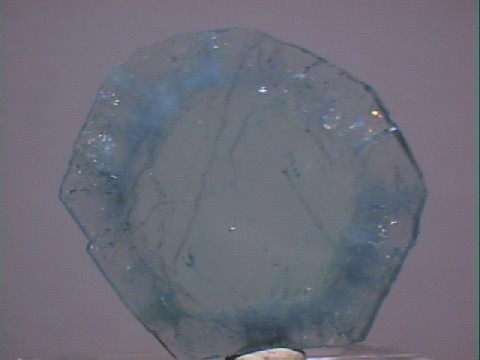
AQUAMARINE specimen aqu-28
$ 150.00
$ 150.00
Dims:1.4x1.2x0.1" (3.6x3.0x0.3 cm)
Wt: 0.2oz. (5g)
Edmonton, Alberta, Canada
This is a cut and polished slice of aquamarine crystal from a most unusual location. The color of this crystal is pale blue, and growth rings are clearly visible. The exterior faces of the crystal are natural and undamaged. There is a small amount of interior shattering in the crystal, otherwise, this is an incredible specimen.
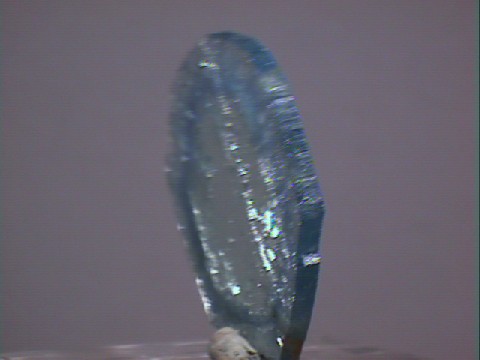

aqu-28 ($150.00)
Edmonton, Alberta, Canada
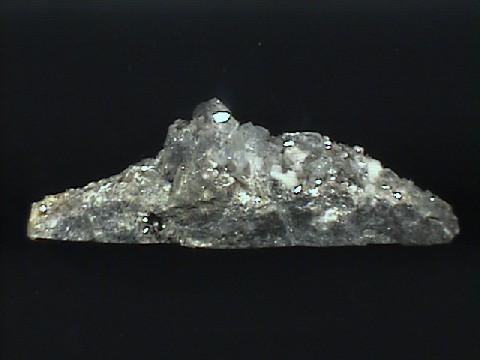
AQUAMARINE specimen aqu-30
$ 90.00
$ 90.00
Dims: 6.97x2.56x2.36" (17.1x6.5x6.0cm)
Wt: 20.7oz. (586g)
China
This cabinet specimen displays about 3 dozen pale-blue aquamarine crystals plus some microcline and muscovite crystals on a large chunk of the host rock. As is typical of aquamarines from this locale, the crystals are flattened hexagons, nearly tabular, and have good transparency which is marred by some internal fractures and difuse, white inclusions. The largest of the aquamarines measures about 15mm on a side.
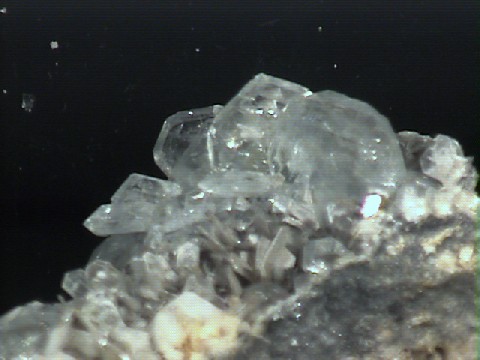

aqu-30 ($ 90.00)
China
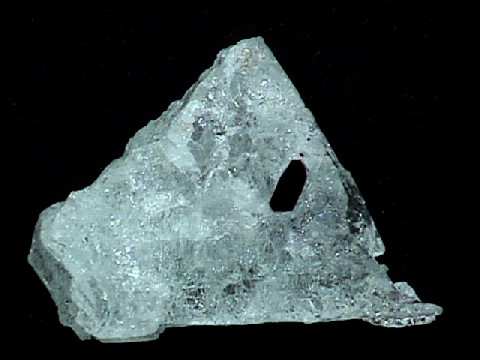
AQUAMARINE specimen aqu-33
$ 60.00
$ 60.00
Dims: 1.69x1.26x0.71" (4.3x3.2x1.8cm)
Wt: 0.73oz (20.7g)
Conselheiro Pena, Minas Gerais, Brazil
This is one of those aquamarine specimens that formed in cavity, and roughly filled it. It does have many natural crystal terminations along with some cleavage and fracture surfaces, but there is no indication of a normal aquamarine crystal shape. There are many holes through the specimen, where the original host rock has been removed. There are enough natural facets in perfect alignment to indicate that this is a single crystal. It is very transparent, and has a lovely light blue color, although not dark enough to be cut for gemstones.
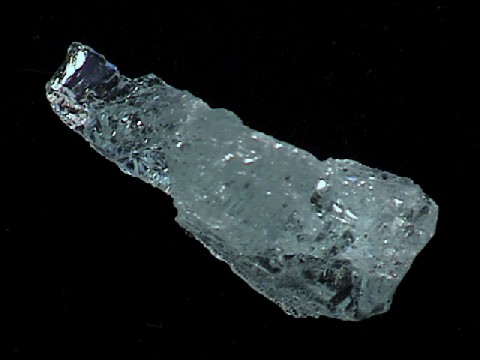

aqu-33 ($ 60.00)
Conselheiro Pena, Minas Gerais, Brazil
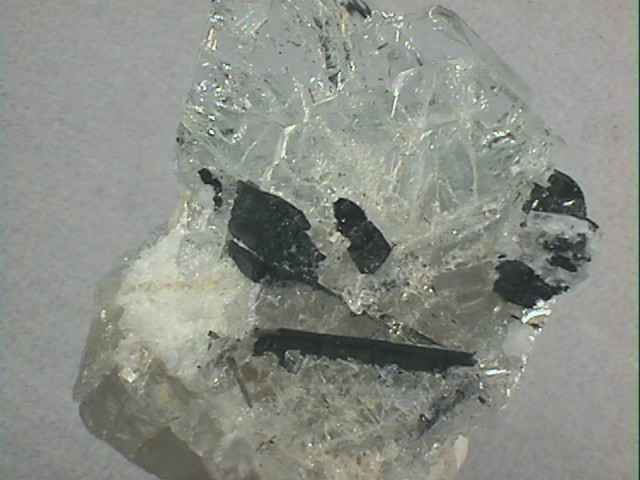
AQUAMARINE specimen aqu-29
$ 35.00
$ 35.00
Dims: 1.26x1.09x0.55" (3.20x2.76x1.39cm)
Wt: 51.2ct (10.24g)
near Resplendor, Minas Gerais, Brazil
This specimen is mostly aquamarine, about half of which is in several nicely-shaped flat hexagonal crystals arranged in a "book". The largest of these crystals is visibly 15mm long and 4mm thick. While the "base" is ocluded enough as to appear white, the nice crystals are pale aqua in color, and quite transparent. There are some internal fractures that reflect a rainbow of colors. The aquamarine is accompanited by a number of dark-green elbaite tourmaline crystals.

aqu-29 ($ 35.00)
near Resplendor, Minas Gerais, Brazil
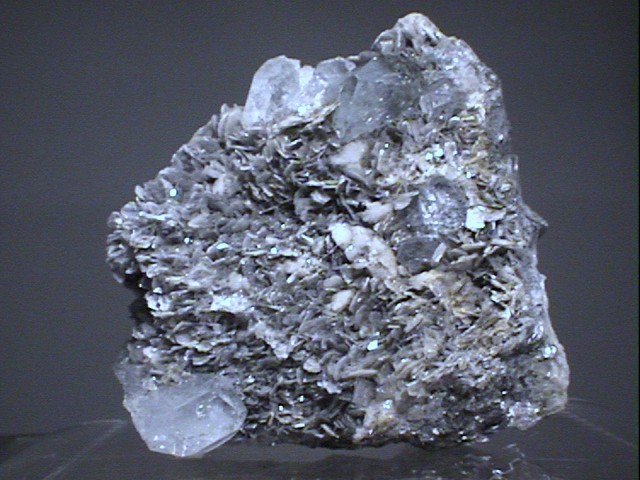
AQUAMARINE specimen aqu-31
$ 45.00
$ 45.00
Dims: 3.27x2.62x1.23" (8.30x6.66x3.12cm)
Wt: 6.43oz (182g)
China
This hand specimen displays 7 tabular hexagonal aquamarine crystals on a muscovite matrix (with an albite base). The aquamarine is transparent and very pale blue, and most of the crystals are relatively well-formed. All show minor damage on most edges.
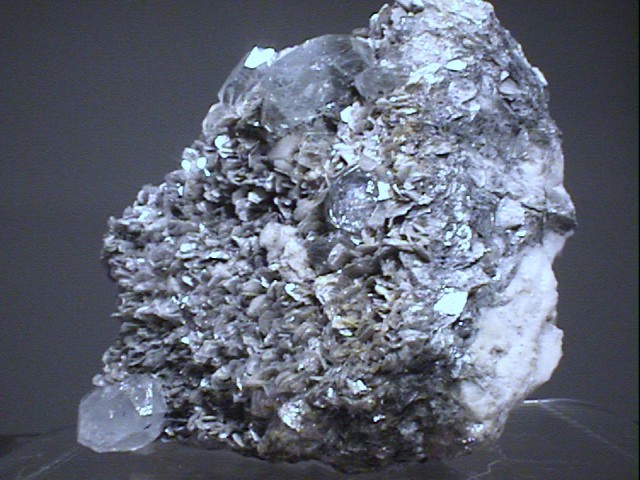

aqu-31 ($ 45.00)
China
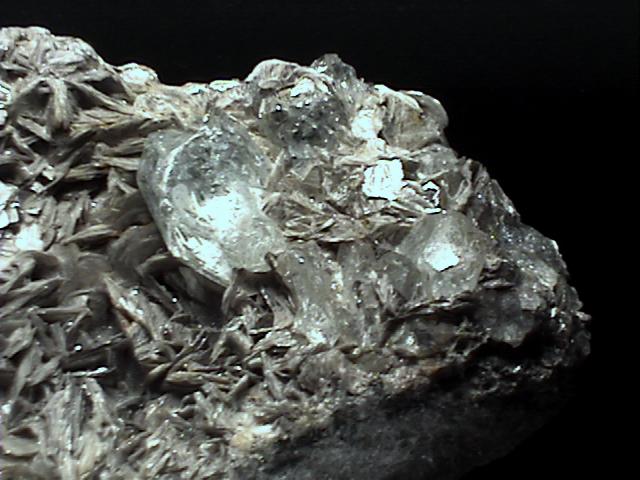
AQUAMARINE specimen aqu-32
$ 35.00
$ 35.00
Dims: 3.25x2.00x1.11" (8.25x5.07x2.81cm)
Wt: 5.28oz (149.4g)
China
This Chinese aquamarine specimen displays one large (and a half-dozen small) aquamarine crystals intergrown with muscovite crystals on a host rock that itself contains multiple minerals, including more muscovite as tiny crystals and possibly more aquamarine, as the rock has a blue cast. There is also a black mineral present which has prismatic crystals, a vitreous luster, and may be opaque.
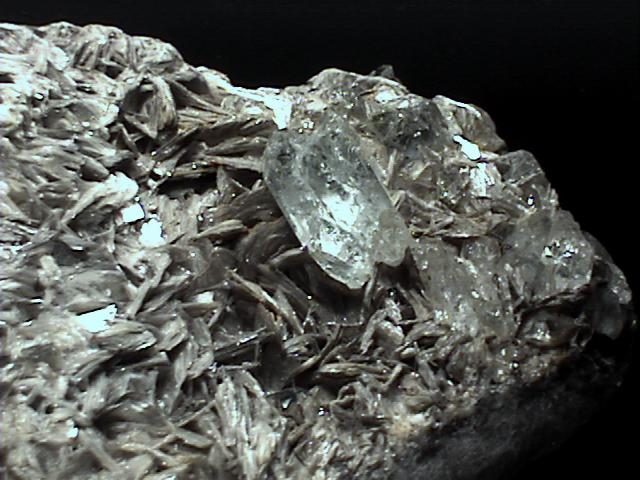

aqu-32 ($ 35.00)
China
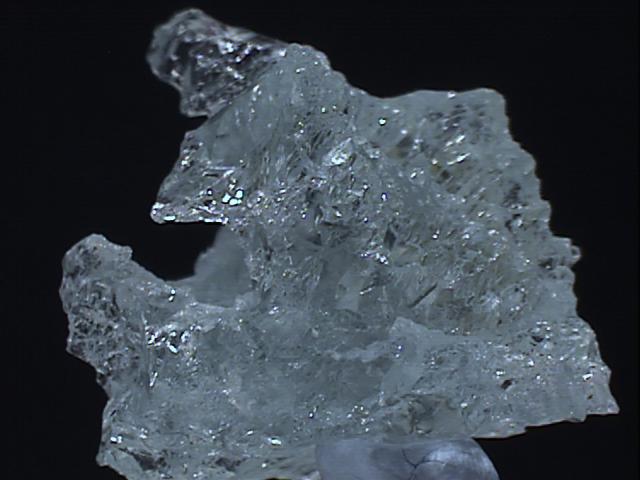
AQUAMARINE specimen aqu-36
$ 45.00
$ 45.00
Dims: 1.12x1.17x0.85" (2.84x2.97x2.16cm)
Wt: 0.60oz (16.9g)
Conselheiro Pena, Minas Gerais, Brazil
This is a very irregular specimen of aquamarine, possibly it filled an irregular cavity in the original host rock (which has been completely removed). The only indications of crystal form are two flat faces that meet at a 120 degree angle (correct for aquamarine), and a number of small flat segments which meet at the same angle. The color is rather pale, and the clarity is excellent. There are a number of caves into the crystal, one of these has a slightly rusty stain.
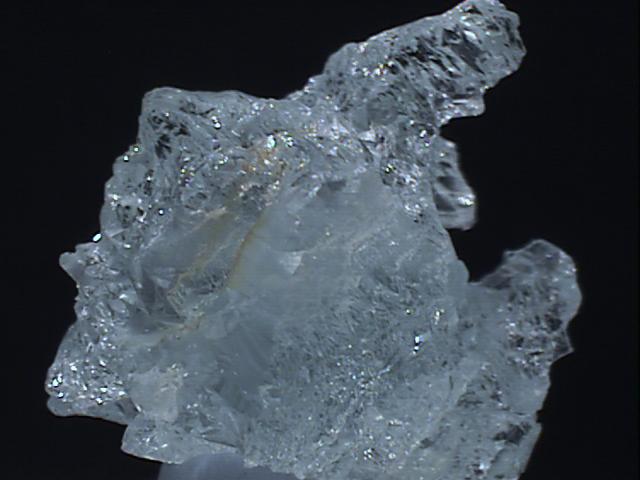

aqu-36 ($ 45.00)
Conselheiro Pena, Minas Gerais, Brazil
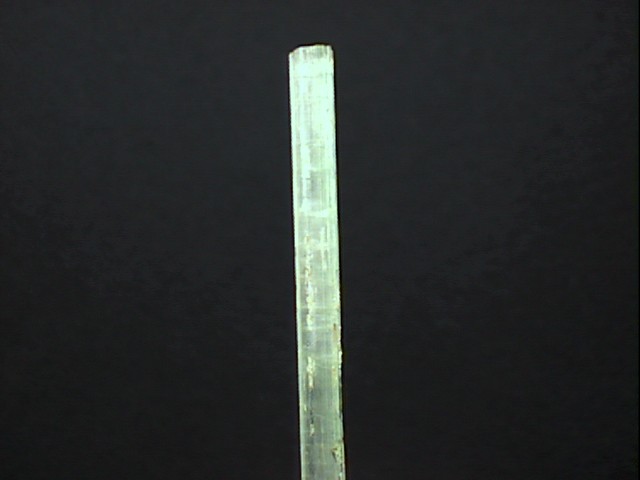
AQUAMARINE specimen aqu-34
$ 50.00
$ 50.00
Dims: 2.71x0.29x0.21" (6.89x0.75x0.54cm)
Wt: 27.5ct (5.5g)
Sherlovaya Gora, Transbaikalia (Zabaykalye), Eastern-Siberian Region, Russia
This long, slender beryl crystal is blue enough to be considered an aquamarine, although its hue has a significant greenish cast. It has a distorted hexagonal cross section, with a natural contact termination at one end, and basal cleavage and fracture at the other. The crystal is quite transparent, with a few dark inclusions and a series of basal internal fractures that display as a dozen white zones when the crystal is illuminated with a bright light. The clarity of the crystal is marred by striations running the length of the crystal, leaving only a few thin windows through which one may examine the interior. Other than the fracture at one end, the only dmage is a fracture near the base where the specimen was removed from its host rock. There are a number of contact points and small pits where more of the host rock was removed, leaving small (often dirty) cavities.
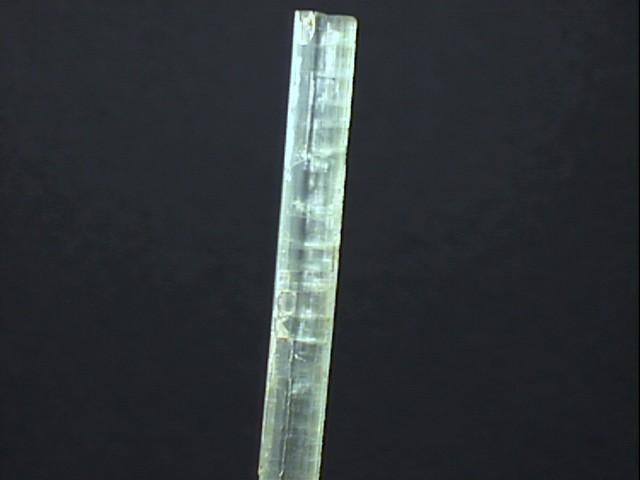

aqu-34 ($ 50.00)
Sherlovaya Gora, Transbaikalia (Zabaykalye), Eastern-Siberian Region, Russia

AQUAMARINE specimen aqu-35
$ 40.00
$ 40.00
dims mm=55.93x5.98x5.93
wt g=3.5
Sherlovaya Gora, Transbaikalia (Zabaykalye), Eastern-Siberian Region, Russia
To my eye, this beryl crystal is distinctly green, so shouldn't it be called emerald? However, its crystal form is very characteristic of many aquamarine specimens, and it comes from a location noted for aquamarine, and if I try real hard I can imagine a hint of blue to its otherwise pale green color. One end shows a basal termination, the other end is fractured. The sides are distorted and deeply striated, giving it more of a round appearance than hexagonal. It is transparent with a vitreous luster.


aqu-35 ($ 40.00)
Sherlovaya Gora, Transbaikalia (Zabaykalye), Eastern-Siberian Region, Russia
